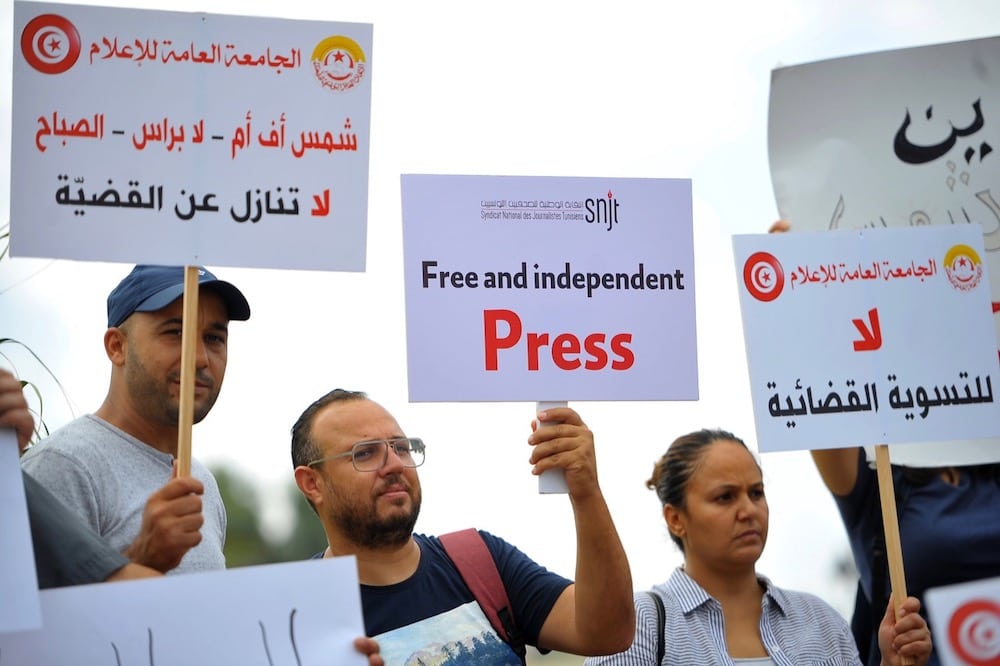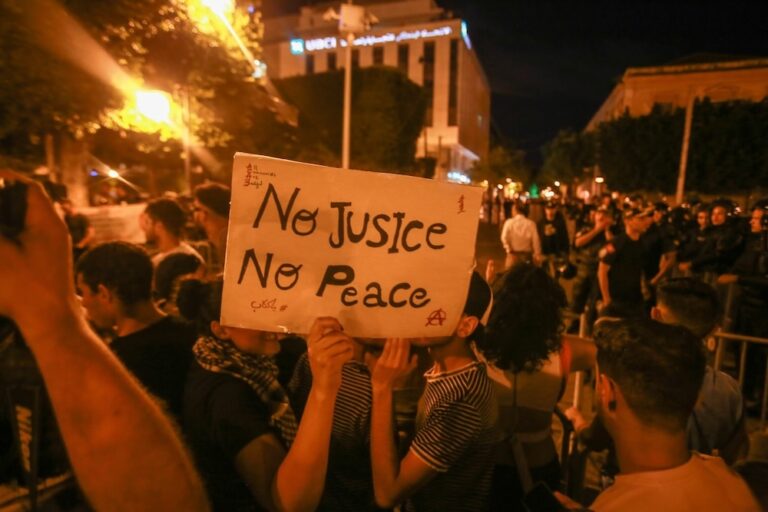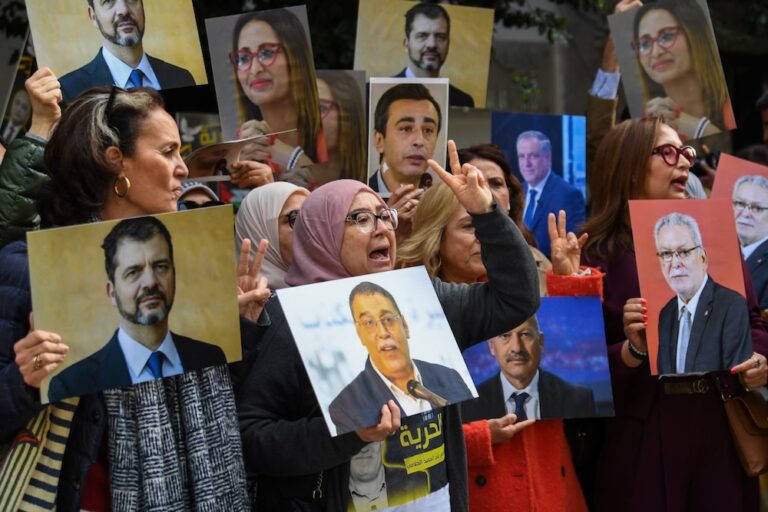Articles in the new decree-law have been the subject of harsh criticism due to restrictions they impose on freedom of expression.
This statement was originally published on smex.org on 25 October 2022.
On September 22, Tunisian reporter and journalist Adel Al Futaiti stood before the Deputy Public Prosecutor to testify in court after a municipal councilor filed a lawsuit against him.
Al Futaiti had been detained after publishing a video showing a local official taking garbage bins that belong to the municipality. The municipal official had also accused the journalist of defaming him.
At the end of the investigation, the Public Prosecutor told Al Futaiti, “You’re lucky your lawsuit was filed on September 12, one day before Decree-Law No. 54 was promulgated; you almost spent a few years in prison. You should be cautious now that the decree is in effect.”
The Decree-Law on Combating IT and Telecom Crimes, issued on September 17 and referred to as Decree 54 in Tunisia, has been strongly criticized by human rights advocates. Many fear it will tighten the noose around freedom of opinion and expression in Tunisia.
A Strong Blow to Human Rights Standards
Decree-Law No. 54 includes 83 articles, divided across five chapters, most of which impose prison sentences of up to six years, as well as fines of up to USD 20,000, on any person who commits a crime mentioned in the decree. This includes fabricating or disseminating fake news and rumors, or what is referred to in the decree as “fabricated or falsified documents.”
Most of the articles in the decree-law have been the subject of harsh criticism due to the restrictions they impose on freedom of expression. It is saturated with unfair punishments against the perpetrators of the “crimes” stipulated in the decree, which are mainly related to media and publishing.
In particular, Article 1 states that the provisions of the Criminal Code, the Code of Criminal Procedure, the Code of Military Procedure and Penalties, and special criminal provisions – which all constitute the set of criminal laws in Tunisia – shall apply to the “crimes” provided for in the new decree, “with the possibility of imposing harsher punishments.”
In addition, Article 24 raised the concern and alarm of several organizations, which considered it to be a flagrant violation of the right to freedom of expression. This article imposes a prison sentence of five years and a fine of more than USD 15,000 on “any person who deliberately uses information and communication networks and systems to fabricate, disseminate, publish, send, or produce false news, statements or rumors or documents that are fabricated, falsified or wrongly associated with a certain party with the purpose of infringing upon other people’s rights or undermining national security or defense.” The abovementioned penalties are doubled if the victim of such actions is a civil servant or state official!
Ayman Zaghdoudi, legal consultant at Article19, told SMEX that Article 24 of Decree 54 is “highly dangerous,” as it nullifies the achievements made to reinforce the freedom of the press and constitutes a violation of Decree-Law No. 115 on the Freedom of the Press, Printing and Publishing.
He added that “this article is a trojan horse breaching all the international standards mentioned in the conventions ratified by Tunisia, as it imposes an indiscriminate penalty of five years of imprisonment on a broad range of crimes.”
Zaghdoudi also criticized the fact that the decree doubles the penalty if the victim is a civil servant or state official, considering that “this is a breach of international standards. In fact, the opposite should be true, as state officials are public figures that have willingly undertaken a public office, and, therefore, they must be more tolerant of criticism.”
Zaghdoudi also stated that this clause is in contradiction with the country’s new Constitution, which stipulates that the penalty should be commensurate with the level of damage caused.
On September 19, the National Syndicate of Tunisian Journalists issued a statement calling for the revocation of the decree due to its “violation of the Constitution and of Tunisia’s international commitments, as well as its breach of freedom of the press and human rights standards as well as the principle that the severity of the punishment should be commensurate with the seriousness of the crime.” The Syndicate also threatened to resort to the administrative judiciary to challenge the validity of the decree.
Rim Saoudi, member of the Executive Committee of the National Syndicate of Tunisian Journalists, told SMEX that “Decree 54 was issued at a time when freedom of expression and freedom of the press were already under attack, ever since the July 25 referendum. Laws are being weaponized to restrict freedom of expression. For more than a year now, authorities in Tunisia have been trying to impose their one-sided policies, but we will not accept that. This is why the Syndicate of National Journalists has called for the revocation of Decree 54.”
Data Collection and Threats to Asylum Seekers
Decree 54 includes a chapter entirely dedicated to the conditions and regulations for investigating the crimes mentioned therein, and it gives the Judicial Police broad access to the data that internet service providers (ISPs) are required to store indefinitely.
Article 9 stipulates that the “Public Prosecutor, investigative judge or Judicial Police officers who are authorized to do so in writing [may] request access to digital data stored on IT systems or servers, data related to telecom traffic or users or other data that would help them uncover the truth.”
Zaghdoudi believes that storing data is legitimate, but he is concerned about the lack of sufficient guarantees to protect this data, which can be used by the state to undermine political opponents or sold to certain parties to harm companies or individuals.
He said that “Chapter III of the decree not only infringes upon the right to protection of personal data, but it also breaches journalists’ right to protect their sources. Journalistic sources are protected by the Decree-Law on Freedom of the Press, Printing and Publishing, which imposes three conditions to divulge such sources: a judicial authorization, the proven need to do so to prevent a crime, and having the judge prove that they have made all possible efforts to obtain the required information but to no avail.”
However, the new decree “enables access to stored data without the need to respect any of the three conditions put forward by virtue of Decree-Law No. 115,” according to Zaghdoudi.
Local and international organizations operating in Tunisia, including the National Syndicate of Tunisian Journalists, the International Federation of Journalists, and Access Now, have warned that the provisions of the decree are in flagrant contravention of Article 19 of the International Covenant on Civil and Political Rights.
Chérif El Kadhi from Access Now told SMEX that “the decree-law is catastrophic. We have called for its revocation, as it is in contravention of international standards. Article 6, which requires telecom services providers to store the data of internet and mobile users, is highly dangerous, because it does not specify the period for which such data should be stored, and it allows breaches of the confidentiality of journalistic sources without offering any protection.”
Moreover, Ramadan Bin Omar, migration expert at the Tunisian Forum for Social and Economic Rights, told SMEX that Chapter IV, entitled Supporting International Efforts to Combat IT and Telecom Crimes, “threatens asylum seekers and illegal immigrants in Tunisia, because it allows their deportation if they commit any of the crimes mentioned in the decree.”
Bin Omar explained that “non-deportation cannot be guaranteed, especially since Tunisia has made reservations on certain conventions, such as International Labor Organization (ILO) Convention 104 on abolishing penalties resulting from workers’ breach of employment contracts.
Although Article 34 of the presidential decree 54 stresses the need to observe international conventions, it does not represent a sufficient guarantee, because this requirement does not have a mandatory character. Therefore, vulnerable foreign nationals may face the risk of deportation to their countries of origin, which some had fled to avoid a certain threat to their lives.”
The legislation governing crimes related to publishing and journalism is subject to heated political debates, which led two ministries to submit drafts for similar digital codes in 2019 – namely, the Ministry of Justice, led at the time by an independent minister, and the Ministry of Information and Communication Technologies, led by Ennahda Movement.
Finally, Zaghdoudi, who is a professor in public law, called into question the purpose of issuing a law on cybercrimes, at a time when the country’s legislative arsenal includes several laws regulating digital spaces, and especially since a new draft for a digital code is being prepared which will cover the same crimes mentioned in Decree 54.
Therefore, the question remains: are Tunisian authorities legalizing repression by issuing that many laws and decrees?



